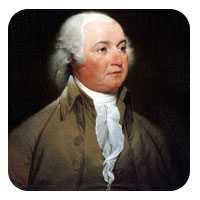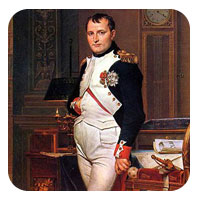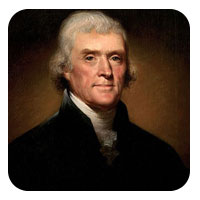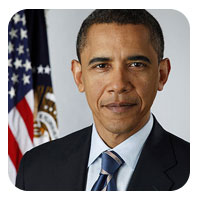A New Government
The election of 1800 was significant not just for U.S. history, but also for world history. When Jefferson and the Democratic-Republicans took office, it marked the first time a contested transfer of power occurred peacefully. Throughout history, it had usually required bloodshed and upheaval to remove a government from power. The people in charge liked being in charge and didn't want to leave.
What was different about these two leaders?


In 1799, Napoleon Bonaparte staged a coup to become the leader of France, which had just gone through a bloody revolution to establish a republican government. In the following years, he added to his power. Even though forced to abdicate in 1814, Napoleon later escaped from exile and tried to reestablish his reign. It took a bloody defeat at Waterloo to finally end his rule of France. The new American republic, in contrast, accomplished a change in government in 1800 with ballots rather than bullets. When Adams was defeated, he left office and returned to his home in Massachusetts.
Thomas Jefferson came to the presidency well esteemed as an intellectual and a scholar. His support of states' rights and economic liberalism were well known. A critic of Federalist policies that benefited the commercial and manufacturing sectors, Jefferson believed the survival of the republic depended upon the American farmer. The new president also retained a faith in the masses and believed that government should not unduly burden its citizens.
What do these two leaders have in common?


In his inaugural address, Jefferson tried to strike a conciliatory tone by declaring, "We are all Republicans, we are all Federalists."
Presidents throughout U.S. history have echoed this theme of conciliation at their inaugurations. In his 2009 inaugural address, Barack Obama declared, “On this day, we come to proclaim an end to the petty grievances and false promises, the recriminations and worn-out dogmas that, for far too long, have strangled our politics. We remain a young nation. But in the words of Scripture, the time has come to set aside childish things.”
President Jefferson and his party did indeed display moderation upon taking office. They honored the agreement to leave much of Hamilton's financial program untouched, and did not seek to dismantle the Bank of the United States. The Republicans even left the tariff passed by Federalists in place. While Jefferson could have totally replaced presidential appointed officials, he replaced about a quarter of the Executive Branch's staff. Jefferson rewarded competence in the public service rather than political loyalty.
However, Jefferson and the Republicans did reverse some of the policies of their Federalist predecessors. Congress repealed domestic taxes, including Hamilton's controversial excise tax. Jefferson pardoned those convicted under the Sedition Act and Congress replaced the Naturalization Act (the other Alien and Sedition Acts had already expired). Jefferson also worked to cut government expenditures and reduce the national debt.
Jefferson targeted the army and navy for cuts, not only to reduce expenses, but also because he distrusted a large military. The U.S. Army lost about a third of its size, and the navy was reduced to six active vessels. In a remarkably foresighted move, however, Jefferson urged an education academy for the military to be located at West Point, New York. Jefferson believed that civilian militias in the states could handle the nation's defense, but technical expertise, like engineering, must be fostered.